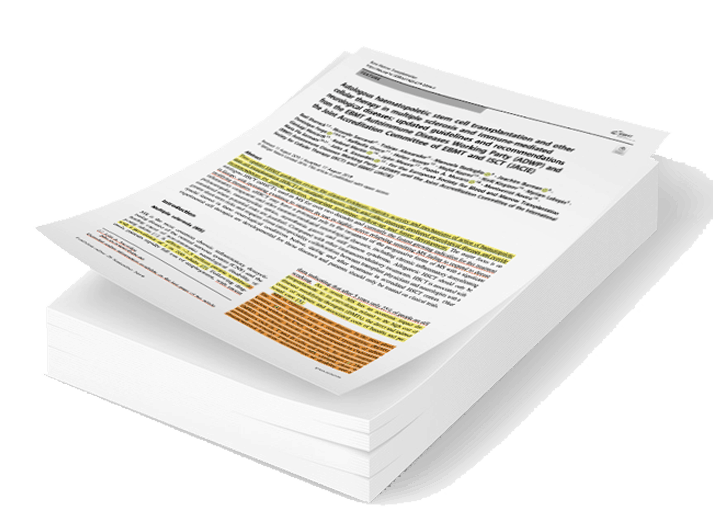
The renowned magazine Bone Marrow Transplantation from the authoritative medium Nature Research published an article on September 26, 20191, containing recommendations for the use of Hematopoietic Stem Cell Transplantation (HSCT) in neurological immune disorders, focussing primarily on MS2.
This article is publicly available through the so-called ‘open access’ system.
The paper originates from the European Group for Blood and Marrow Transplantation (EBMT) and specifically from the Autoimmune Diseases Working Party (ADWP), in collaboration with the Joint Accreditation Committee or EBMT and ISCT ( JACIE ).
The publication provides an overview of the current clinical evidence and scientific insights for the use of HSCT in neurological immune diseases. The article is partly based on reports of transplants that have been submitted to the so-called EBMT registry. This registry contains data from all transplants that have been performed in EBMT-affiliated and accredited centres.
Based on these insights, the authors of the paper make a large number of recommendations on the use of autologous Hematopoietic Stem Cell Transplantation (aHSCT) in MS. They also address the following questions:
- for which patients should aHSCT be one of the treatment options,
- which transplantation technique can best be used,
- how should the follow-up take place and
- what should be taken into account in the future?
Insiders consider this publication to be very well-founded and complete, coming from the most important available source in the field of HSCT.
Findings and recommendations include:
- Patients with ‘aggressive’ MS3 who have developed severe disabilities in the last 12 months are suitable candidates for aHSCT. Given the possibility that irreversible disability may develop, treatment may be considered before the end of the full assessment period for a regular MS drug that the patient uses.
- The aHSCT treatment should be considered for patients with RRMS who continue to have inflammation in the central nervous system despite the use of medication4.
- aHSCT may play a role in the treatment of progressive forms of MS. However, based on scientific insights, the authors recommend aHSCT only when a patient has had inflammation in the central nervous system in the past year. It is preferable to offer the HSCT-treatment as part of a clinical study in progressive MS patients.
- The treatment must be done in transplantation units that provide high-quality care and are accredited by JACIE or a similar organization.
- Due to a lack of data on the effectiveness of other treatment schedules, the authors recommend the use of the protocol recommended by the EBMT. Either with cyclophosphamide 200 mg/kg + ATG or BEAM + ATG.
- After treatment, patients must regularly be checked by experienced specialists. An annual consultation by both a haematologist and a neurologist is recommended, also in the long term.
- Treatment with other stem cell therapies (for example with mesenchymal stem cells) is currently not recommended because there is insufficient evidence for safety and effectiveness.
- Autologous haematopoietic stem cell transplantation and other cellular therapy in multiple sclerosis and immune-mediated neurological diseases: updated guidelines and recommendations from the EBMT Autoimmune Diseases Working Party (ADWP) and the Joint Accreditation Committee of EBMT and ISCT (JACIE)
- In this post I will not consider other neurological immune diseases.
- About 4–14% of MS patients have ‘aggressive’ disease and experience an accelerated (3–4 times faster) disease course
- The researchers are talking about at least two clinical relapses or one with active MRI lesions in the previous 12 months. The studies conducted so far show that effectiveness is highest in patients who can walk independently (EDSS 5.5 or less), who are younger than 45 and have a disease-duration below 10 years.